
views
Working with Your Doctor

Consult your doctor to get personalized treatment advice. If you have a weakened heart due to congestive heart failure, a heart attack, or some other cause, you almost certainly have plenty of experience being around doctors. Your primary care physician and any specialists who have treated you understand your condition and needs very well, so you should work with them to formulate the best strategy for strengthening your cardiovascular system. In most cases, a weakened heart needs to be strengthened in order to either sustain or improve upon its current capabilities. That said, there’s no “one size fits all” approach to strengthening a weak heart, so always seek out and follow the advice of your medical team. Even if you have a healthy heart and are looking to make it even stronger, you should consult your doctor for personalized guidance.
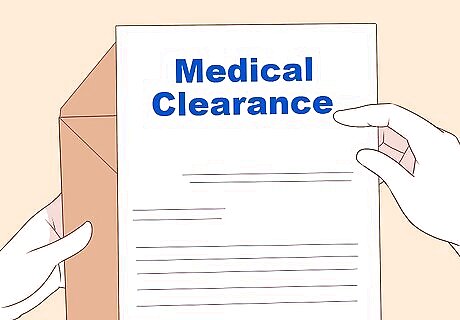
Get medical clearance before starting an exercise program. Exercises that may strengthen one person’s weakened heart may cause further damage to another’s. That’s why it’s so critical that you get a personalized evaluation of your condition, including specific guidance on any exercise regimen you should begin. Don’t start doing an exercise program just because your friend who had a heart attack is getting good results doing it. No two weakened hearts are the same, and they require individualized exercise programs. If you’re already on an exercise program, consult your doctor before making any changes.

Take any medications prescribed to you for your heart condition. No matter the cause of your weakened heart, you’ll most likely be put on several prescription medications. While the specific medications will vary based on the nature of your condition, it’s essential that you take them exactly as prescribed. For example, common heart failure medications include: ACE inhibitors, including captopril, enalapril, and fosinopril. ARBs, such as losartan and valsartan. ARNIs, like the combination sacubitril/valsartan. Beta blockers, including metoprolol succinate and carvedilol. Diuretics, such as furosemide, bumetanide, and torsemide. Anticoagulants (blood thinners). Statins (cholesterol-reducing drugs).

Discuss surgical procedures that may benefit your heart. Depending on the specific nature of your weakened heart, one or more of several surgical options may help to either maintain or improve your cardiovascular function. Talk about the potential benefits and risks of recommended procedures with your doctor and heart specialists. Your options may include: Implanting an internal defibrillator (ICD) to correct arrhythmias. Implanting an LVAD to help your left ventricle pump blood. CRT therapy to improve cardiac efficiency, via an implanted pacemaker. Angioplasty (PCI) to clear coronary artery blockages. Coronary artery bypass surgery to reroute blood flow around blockages. Heart transplantation, when other measures cannot sustain cardiac function.
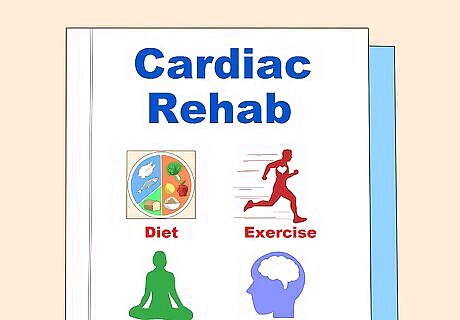
Get a referral for cardiac rehab if you’re medically eligible. Cardiac rehab is a holistic program—focusing on areas like diet, exercise, lifestyle, and mental health—for a person recovering from a heart attack or dealing with other cardiovascular issues. In the United States, certified cardiac rehabilitation programs are considered medical treatments, which means they require a medical referral in order for you to enter the program. Some benefits from cardiac rehab include improved cholesterol, decreased blood pressure, and prevention of type 2 diabetes. If your doctor recommends that you enter such a program, work with them to determine which available cardiac rehab program best suits your needs. The cardiac rehab program should be certified by the relevant government authority where you live, as well as by a professional organization dedicated to cardiac care. All staff members should be properly certified as well. If you do not qualify for a referral to cardiac rehab, work with your doctor and other members of your existing medical team to replicate (as best as possible) the major elements of a rehab program.
Starting an Exercise Regimen

Start slowly, based on your doctor’s recommendation. If you’ve been diagnosed with a medical condition that has weakened your heart, it’s absolutely vital that you follow your doctor’s guidance in beginning an exercise program. If you’re just looking for ways to make your healthy heart even stronger, you should still talk to your doctor about your goals and how best to achieve them through exercise. Depending on your circumstances, starting slowly may involve taking a short walk and doing a few light stretches every day. Or, it may mean incrementally progressing from your current walking regimen into a more advanced cardio and strength training regimen. Working too hard and too fast may put too much strain on your cardiovascular system and cause further damage. At the same time, though, you can’t be afraid to exercise a weak heart—exercise is essential to making it stronger.
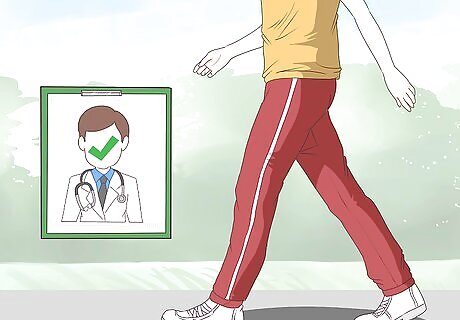
Begin a walking program as an easy way to get aerobic exercise. If you’re starting an exercise regimen for the first time or trying to get back up to speed after a cardiac event like a heart attack, your doctor may recommend a walking program. Walking is often the easiest way for someone with a weakened heart to get aerobic exercise, although biking, swimming, or water aerobics may be other options. You might, for instance, be advised to begin your program by walking slowly for 5-10 minutes each day. Over a period of weeks or months, you might build up to walking for 20-30 minutes daily. You might also slowly ramp up your walking speed, with the goal being to breathe more heavily than normal but still be able to have a conversation.
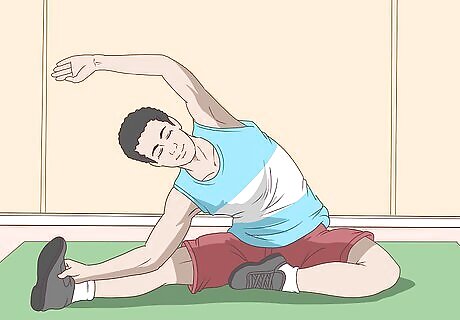
Add flexibility and strength training exercises to your routine. While aerobic exercise should be the backbone of your heart-strengthening exercise program, you should also make room for resistance and flexibility exercises. Doing all three types of exercise can help you manage your weight, build muscle, and improve your balance and flexibility, all of which can help reduce the strain on your heart. For flexibility training, you might do a range of seated or standing stretches, or join a yoga class. For strength training with a weakened heart, you should avoid isometric exercises (like sit-ups and pull-ups) and use weights of no more than 5–10 lb (2.3–4.5 kg), unless otherwise directed by your doctor.
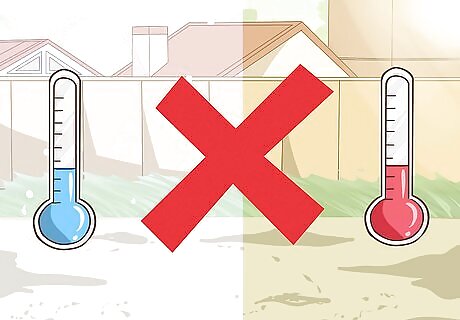
Avoid exercising outdoors in cold, hot, or humid weather. As someone with a weakened heart, you should move your exercises indoors if the temperature is below 20 °F (−7 °C) or above 80 °F (27 °C), or if the humidity is above 80 percent. Exercising in abnormally cold, hot, or humid conditions adds extra strain on your heart, and may be dangerous based on your condition. If you have a shopping mall nearby, use its long, climate-controlled corridors to your advantage when the weather is bad and do your walking there.
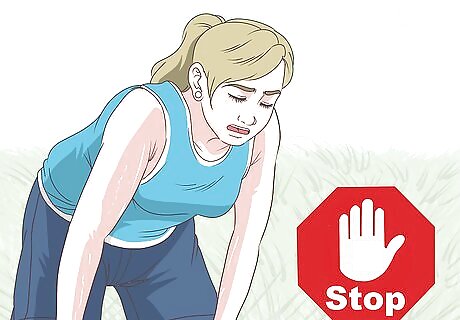
Stop exercising and get help if you experience signs of trouble. It’s vital that you listen to your body while exercising, especially if you have a weakened heart. Follow your doctor’s specific guidance, but consider the following general advice: If you feel short of breath or fatigued, stop exercising and rest for 15 minutes. Call your doctor if you still feel the same way, or contact emergency services if necessary. Likewise, if you experience heart palpitations or your heart rate is elevated beyond what your doctor recommends (for instance, 120 beats per minute), rest for 15 minutes and seek help if the condition does not improve. Don’t ignore pain while exercising, especially chest pain. If you feel tightness, pressure, or pain in your chest, get help right away. Seek emergency help if you pass out, even if you only lose consciousness for a brief period of time.
Making Lifestyle Changes

Improve your diet as recommended by your doctor or nutritionist. In most respects, the typical diet that’s recommended for strengthening a weak heart is the same as the healthy diet recommended for the population at large. You’ll be advised to eat lots of fruits and vegetables (about half of your plate at each meal), and to fill out your plate with lean proteins, whole grains, and healthy fats. At the same time, you’ll need to cut back on processed foods, saturated and trans fats, and sodium. A heart-healthy diet helps you to limit plaque buildup in your arteries, keep your blood pressure in check, and maintain a healthy weight, all of which will benefit your weakened heart. If you take part in cardiac rehab, make sure to keep up the diet they advise for you after completing the program. If you’re not in a cardiac rehab program, work with your doctor and a nutritionist to determine the best dietary changes to make in your case.

Quit smoking if you are a smoker. Smoking is a major risk factor for a range of cardiovascular problems, as well as a host of other diseases and medical issues. It will be practically impossible to strengthen your weakened heart if you continue to smoke. There are numerous treatment options to help you quit, including patches, lozenges, medications, and therapy. Work with your doctor to determine the best combination of treatments for you.

Find ways to reduce your stress levels. Excess stress causes an increase in blood pressure, which puts even greater strain on an already weakened heart. Discuss options for reducing stress in your daily life—some options may include: Trying meditation, yoga, or deep breathing exercises. Spending time in nature. Making changes at work, or even changing jobs. Spending more time on activities that you enjoy and that make you calm. Meeting with a mental health professional.

Aim to get more restful sleep at night. Sleep allows every part of your body to rest and recover, including your weakened heart. If you’re not getting 7-8 hours of uninterrupted, restful sleep every night, your heart probably isn’t getting the recovery time it needs. Talk to your doctor or a sleep specialist about strategies like: Creating a consistent bedtime routine. Making your sleeping area a more restful environment. Avoiding things like exercise, caffeine, and stressors at bedtime. Using sleep aids under your doctor’s guidance.

Seek out emotional support from professionals and loved ones. Dealing with a weakened heart due to congestive heart failure, a heart attack, or other causes can have a major psychological impact. For that reason, many cardiac rehab programs include counseling sessions with mental health professionals, group therapy with other cardiac rehab patients, or both. If you’re not in cardiac rehab, make sure you’re getting the emotional support you need. Counseling sessions provide a safe venue for you to talk about your fears or concerns, and they can help give you the confidence and motivation to take the necessary actions to strengthen your heart. In addition to meeting with a mental health professional or attending a support group for people with cardiac issues, also embrace simpler opportunities like enjoying long chats with a close friend.



















Comments
0 comment